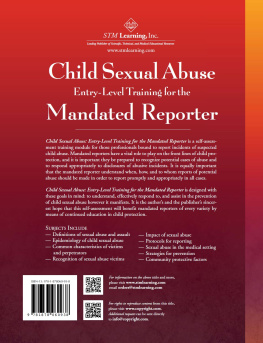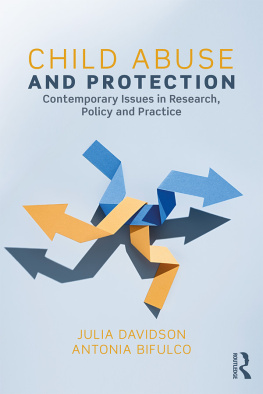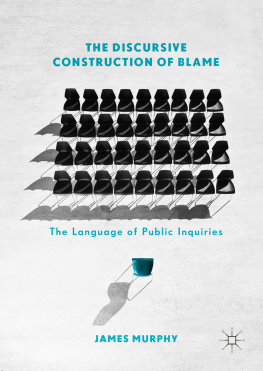
Governing Child Sexual Abuse
The turn of the 1990s saw a number of high profile public inquiries into the handling of child sexual abuse investigations in Great Britain. Governing Child Sexual Abuse examines the implications of these inquiries on the regulation of relationships between families and the state. In so doing, Samantha Ashenden brings a number of contemporary debates in social and political theory to bear upon the governance of child sexual abuse. In particular, drawing on the work of Foucault and Habermas, she looks at:
The liberal constitution of a boundary between public and private spheres
The legal and scientific determination of legitimate intervention
The relation between democracy and expertise in the governance of social life.
This book will be of particular interest to scholars and students of social and political theory, political sociology, the sociology of law and social policy.
Samantha Ashenden is Lecturer in Sociology in the School of Politics and Sociology at Birkbeck College, University of London.
Governing Child Sexual Abuse
Negotiating the boundaries of public and private, law and science
Samantha Ashenden
First published 2004 by Routledge
Published 2016 by Routledge
2 Park Square, Milton Park, Abingdon, Oxon OX14 4RN
Simultaneously published in the USA and Canada by Routledge
711 Third Avenue, New York, NY, 10017, USA
Routledge is an imprint of the Taylor & Francis Group, an informa business
2004 Samantha Ashenden
Typeset in Baskerville by
Keystroke, Jacaranda Lodge, Wolverhampton
All rights reserved. No part of this book may be reprinted or reproduced or utilised in any form or by any electronic, mechanical, or other means, now known or hereafter invented, including photocopying and recording, or in any information storage or retrieval system, without permission in writing from the publishers.
British Library Cataloguing in Publication Data
A catalogue record for this book is available from the British Library
Library of Congress Cataloging in Publication Data
Ashenden, Samantha.
Governing child sexual abuse : negotiating the boundaries of public and private, law and science / Samantha Ashenden.1st ed.
p. cm.
Includes bibliographical references and index.
1. Child abuse. 2. Child abuseSocial aspects. 3. Child abuseLaw and legislation. 4. Child welfare. I. Title.
HV6626.5.A854 2003
362.76561dc21
2003008615
ISBN 13: 978-0-415-15893-0 (hbk)
ISBN 13: 978-0-415-15894-7 (pbk)
To the memory of Paul Hirst
Contents
PART I
Conceptual frameworks
PART II
Examining the governance of child sexual abuse
I should like to thank my students at Birkbeck College for their lively curiosity and critical engagement with many of the ideas presented here. I am also grateful to colleagues in the School of Politics and Sociology for their comradeship and good humour. Paul Hirst, in particular, was an important inspiration, as a supervisor and as a colleague. On many occasions he urged me from my epistemological pit, produced intellectual challenges and engaged with me in a spirit of exemplary generosity. He also read the whole manuscript and provided invaluable suggestions. I owe much to his honesty, encouragement and support; his recent death is a very deep loss.
Special thanks are due also to David Owen. This book contains many ideas conceived in conversation with him, and owes a great deal, both in general orientation and for many specific formulations, to his critical care and attentiveness. Thanks also to members of the History of the Present research network, in London and elsewhere, for lively discussion of many of the themes presented here. James Brown and Alexandra Hingst have been constant friends. Jamess intellectual curiosity, willingness to think deux, and his and Ls culinary generosity through my recent period of nomadism have made finishing this text far more fun than it should have been. Thanks to Kelvin Knight for his encouragement, belief in my capacity to write, and for his astute and constructive criticisms of my arguments. Thanks also to John B. Thompson who supervised an MPhil dissertation on Habermas during which time I began thinking about some of the ideas and questions that were to become motivating concerns of this book. I am also indebted to Mari Shullaw for her patience and encouragement in pursuing the publication of this book despite hiccups and delays.
Jacqui, Chris, Jenny and Suzi Butler have been there through the whole thing. Particular thanks go to Jacqui, whose longstanding friendship, wit and occasional provision of red wine, chocolate cake and industrial strength coffee has sustained me through many personal and intellectual crises. Thanks to Philip Spencer, Jane, Rosa and Reuben Anderson, and to Steve Bastow, Stalo Phylactou and Lara Phylactou-Bastow, for their inspiration, for all their love and support, and for leaving me their houses, cats and gardens across long summers. Special thanks go to Steve, for helping with the French and for editing out superfluous prose. Tim Edwards has engaged with the issues with directness, and I thank him for his ongoing friendship, and for constructive criticisms of several chapters of this book. Particular thanks are due to my parents, for their practical and emotional support for my pursuing this work, and for their ongoing love. Finally, I would especially like to thank Martin, for his patient reading and assiduous criticism of the whole text, but mostly for meeting me.
EPO | Emergency Protection Order |
NSPCC | National Society for the Prevention of Cruelty to Children |
PAIN | Parents Against Injustice |
PSO | Place of Safety Order |
RAD | Reflex anal dilatation |
RSSPCC | Royal Scottish Society for the Prevention of Cruelty to Children |
SRAG | South Ronaldsay Action Group |
SSD | Social Services Department |
SWD | Social Work Department |
The case [Cleveland] illustrates how the concept of child abuse craves objectivity
(The Social Construction of What? Ian Hacking 1999: 150)
Mark it for a sign, mark it!
(The Crucible, Arthur Miller [1953] 2000: 30)
This book is a study in the governance of social life and of the way certain specific social theories attempt to account for it. Its aim is to enhance our understanding of contemporary practices of governance by focusing on the analysis of a particular problem: child sexual abuse.
The sexual abuse of children raises stark questions concerning the limits of legitimacy of, and appropriate means for, public interventions into the private sphere of the family. It also raises challenging questions concerning the forms of, and effects created by, legal and scientific knowledge and practice through which social life is organised. Child sexual abuse thus constitutes a site on which tensions in the relationship between public and private spheres emerge, in which law and science meet, and where the interface between democracy and expertise is disclosed. This book aims to bring questions central to contemporary discussions in social and political theory into direct relation with this important social issue, in order to examine what the governance of child sexual abuse tells us about our forms of political reasoning. Rather than focusing on child sexual abuse as such, this book examines how this problem is governed. Its concerns are therefore two-fold: the analysis of contemporary familystate relations, and the interrogation of different conceptual approaches to these relations and their effects. This introduction provides a preliminary outline of how these two frames of reference are figured in the chapters that follow.






